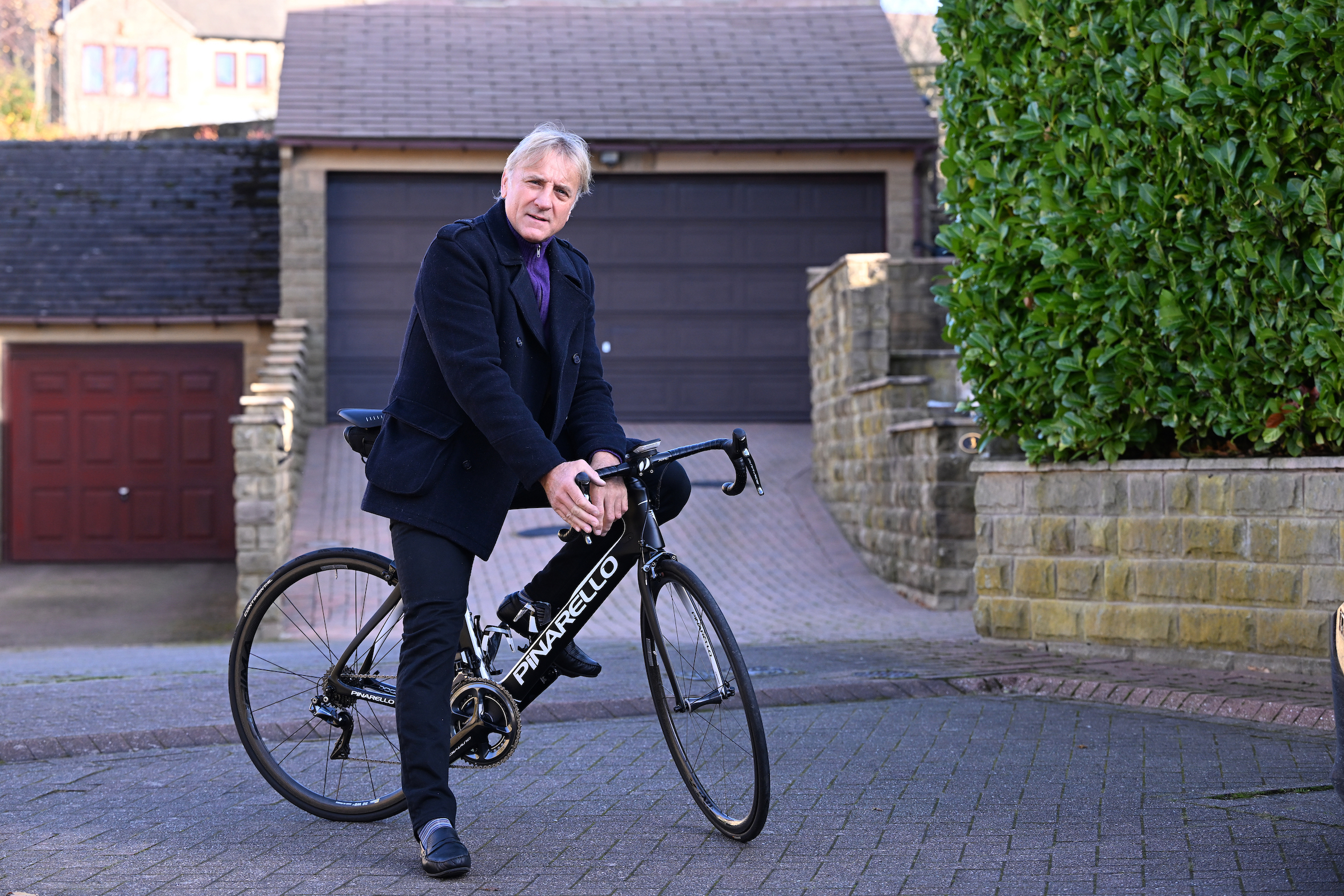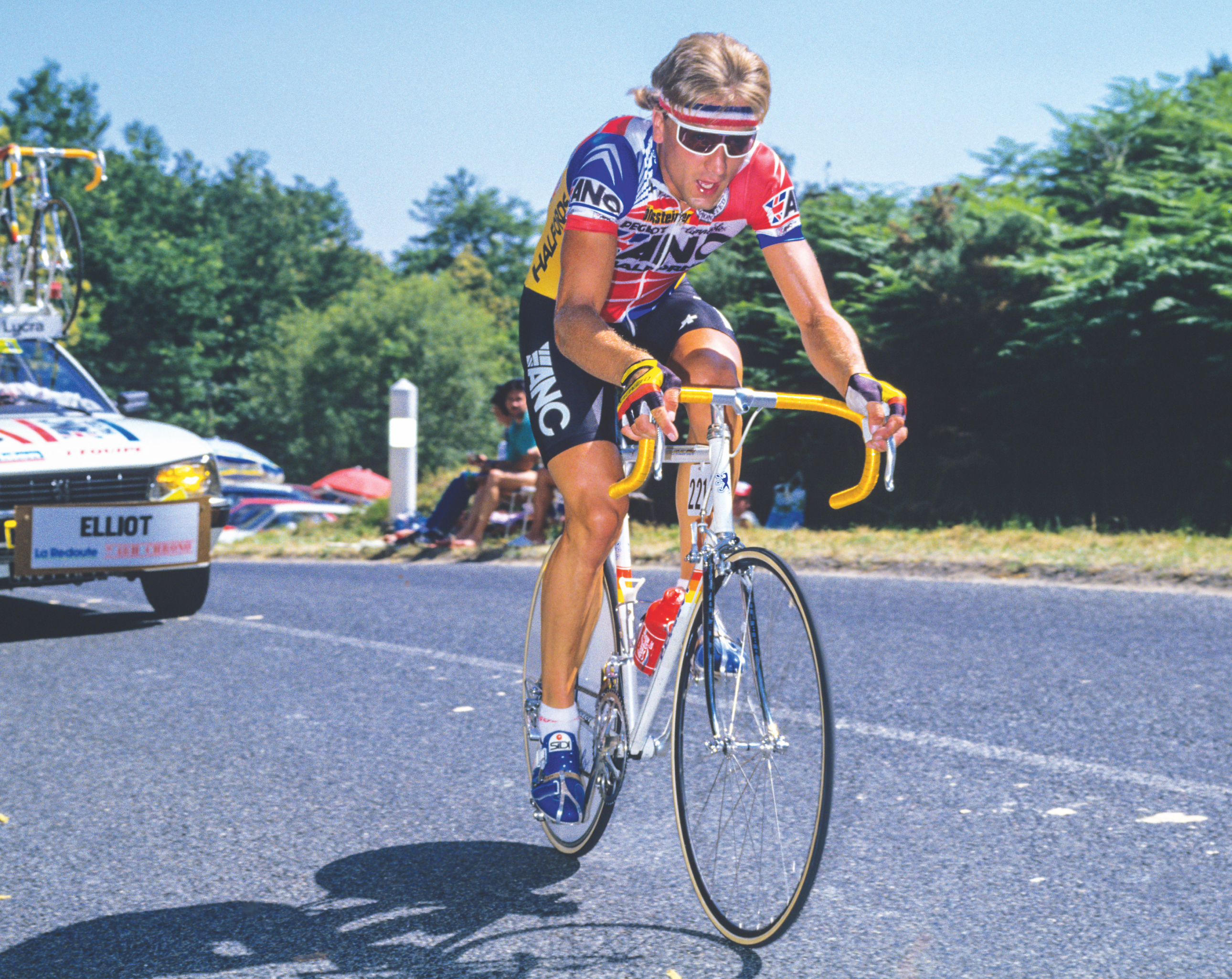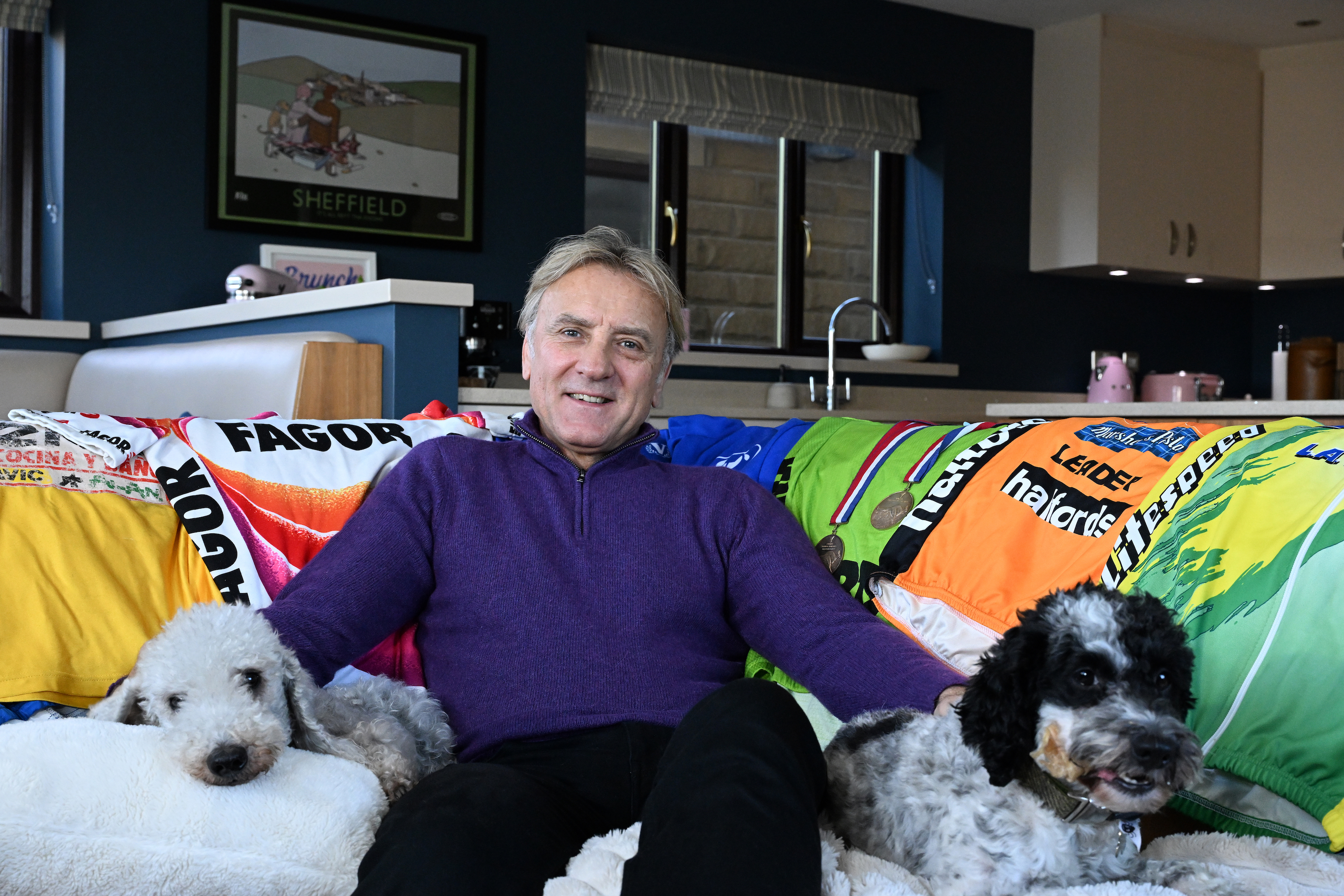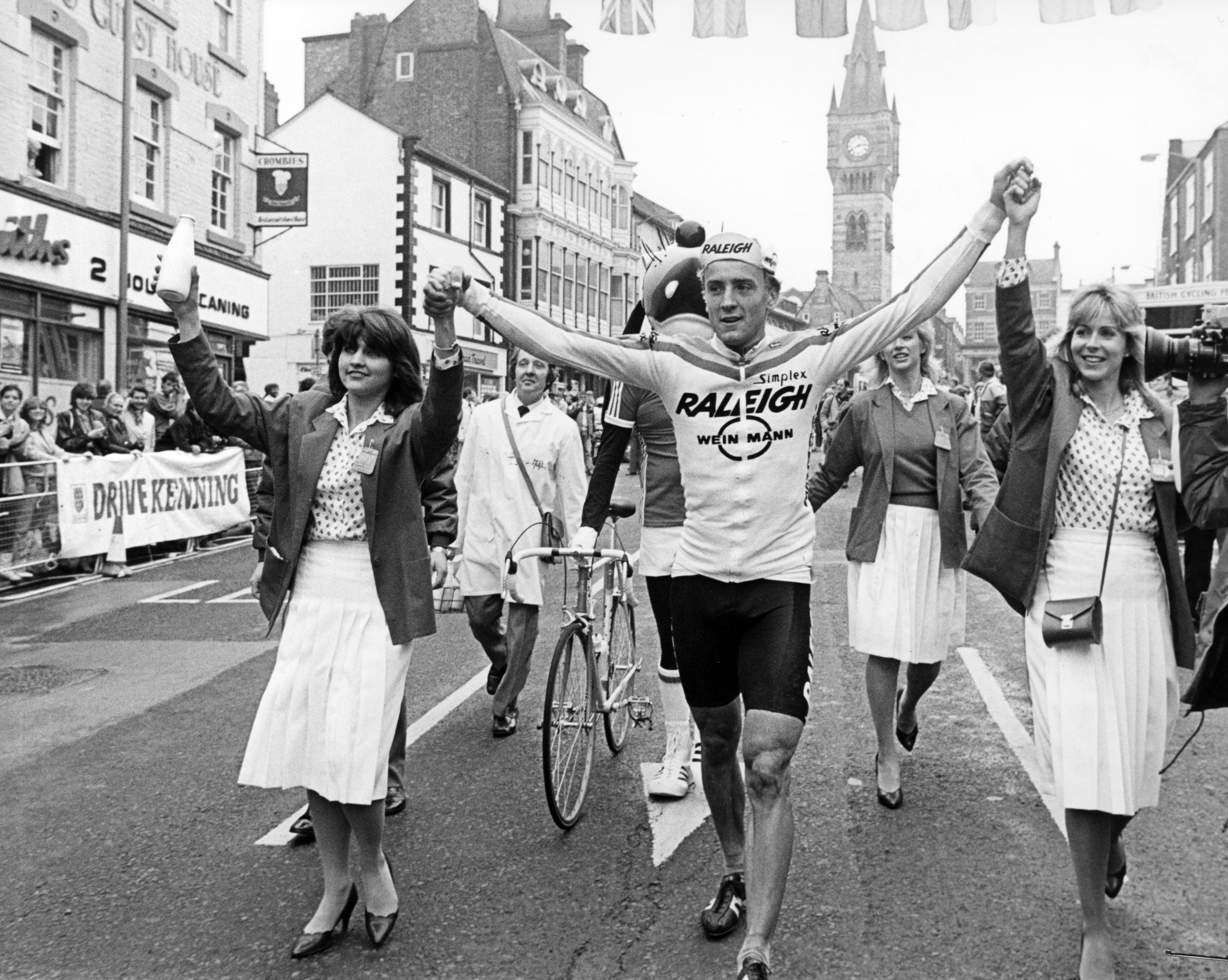
If you remember the Eighties, you'll remember Malcolm Elliott. One of Britain's brightest hopes on the Continent, the Yorkshire rider could take on anyone in the world in a bunch sprint (and win – on his day). Beach-blond hair and his trademark sleeveless jerseys made him a bit of a poster boy too.
Elliott famously rode for ANC-Halfords, the first British trade team to ride the Tour de France, in 1987. He was one of four of the team's riders to finish the race too, kicking off a Grand Tour career that peaked two years later with two stage wins and the points jersey at the Vuelta a España.
Even at that point Elliott was just getting started with a professional career that lasted initially until 1996, before he revved up again delivering considerable domestic success between 2003 and 2011.
He's still riding his bike; still involved in the sport. He took Cycling Weekly through his many faceted career.
Elliott's pathway into cycling is a familiar one: hanging out with his mates and burning up the tarmac around his home town – Sheffield, in Elliott's case. Even during that formative time it was clear that he was on to a winner. "My abiding memory," he says, "Was having to wait at the top of every hill."
Eventually, his pals were ready to move on from cycling whereas Elliott was not. "We got to 14 or 15 and they started looking at motorbikes... So at that point I just had to start going out by myself more," he says.
It was when his dad took him to watch some races in Sheffield city-centre that Elliott was really hooked. "I was completely overwhelmed by what I saw as the glamour of it all," he says. "The colour, and the chrome spokes glinting, and the hum of the tubular tyres pumped to about 10 bars… all this fantastic machinery. I just knew then that that's what I wanted to do."
Soon after that he joined the nearby Rutland cycling club and started time trialling.
That was 1976, when Elliott was turning 15. Like many, his first races were time trials and he even remembers what time he did for his first '10' – 25.49. Quite a performance for a novice on an old-school steel road bike. The following year he got his first "proper bike" – a Holdsworth Pro in classic blue and orange, and he was away.
Elliott rode the Peter Buckley series races as a junior, finishing third overall in 1979. The following year he won the National Championship hill-climb, demonstrating that as well as having a very powerful sprint, he was no one-trick pony.
His breakthrough, though, came at the Commonwealth Games in Brisbane in 1982, where he won two gold medals - first in the team time trial and then in the road race. "That started a love affair with Australia, really," Elliott says. "They were great times. I must have been out there 10 or 12 times since then."
After riding for the French club team UV Aube in the early Eighties, Elliott penned his first pro contract at the end of 1983 with Weinmann-Raleigh and in 1985 he continued his success Down Under when he became the first non-Aussie to win the overall at the Herald Sun Tour, taking four stage wins in the process.

Winging it
There were few British fans from that era who missed his next move – to ANC-Halfords and eventually, the Tour de France. "Looking at us by today's standards, we were winging it, but to be honest, it was a fantastic journey," he says of his time at the team.
The 1987 Tour de France – his first Grand Tour – was even more of a baptism of fire than he expected, partly because of how fast it was and partly because of how tired he already was when he arrived.
"All the Tour veterans were saying how ridiculously fast that race was right from the start," he says. "We had no training camp like they do these days. I think we did one small stage race – the Midi Libre – as preparation."
Having led the Milk Race from start to finish back in Britain that year, Elliott says he was tired and under-prepared by the time he reached the Tour, but all the same, he managed to acquit himself creditably, nabbing third in Bordeaux – a famous arena for the Tour's bunch sprinters.
"I always think about that third in Bordeaux and I feel like I should have won that," he says now. "Jean-Paul van Poppel [father of Danny] took Teun van Vliet down. I was closing fast on them both and suddenly van Vliet went sprawling across the road. It took away all my impetus."
Elliott rode the Tour twice and recorded eight top-10s but never did win a stage. He made up for that in the Vuelta a España though, with a total of three stage wins and in 1989, the points jersey to boot. "At the time, winning the classification wasn't the focus," he says. "My prime focus was to win stages."
He did so with aplomb, but Elliott's ability in the bunch sprints had made him a marked man – not just by his rivals but also in the eyes of his team bosses in the late-Eighties, who expected him to perform constantly. The pressure eventually drove him away from Europe.
"The last couple of years in Spain, my results weren't as good as they had been," Elliott says. "It was not a nice atmosphere in the team with the management. Maybe I was just being sensitive to it, but I always felt pressure. Real pressure. There were not particularly happy times."

American dream
Seeking something different – "needing something different," he says – Elliott crossed the pond, joined the Chevrolet-LA Sheriff team in the USA and found a new lease of life. "I had a blast there, it suited me. I just loved everything about it," he says. "They were the best years of my career really, in terms of just feeling good and enjoying racing."
For the 1997 season, aged 35, he signed what was his first two-year contract for the US Comptel team, only for it to all come crashing down five months later when, as Elliott says, "the cheques just dried up" and the team folded. It was time to call it a day.
He left cycling behind – or at least consigned it to the back burner.
For five years, he says, "I rode my bike at most a handful of times a year. Perhaps at Christmas time I'd go out on the Boxing Day run with the lads."
But then in 2002 a decent ride in a Gran Fondo with friend Phil Griffiths in whet his appetite. Still it wasn't until the following February that he found himself on a training camp and decided almost spontaneously to start racing again. "My initial thought was to maybe have a go at the masters nationals or something. But by the time I'd got ready to race I didn't want to do that, I just wanted to get back into elite racing."
And so began Act II of Elliott's pro career, riding for Pinarello, CandiTV and Motorpoint. The next eight seasons took him well into his forties, but that didn't stop him winning races including the Beaumont Trophy, CiCLE Classic and the National Circuit Championship.
"I was enjoying it more then than I did in the years before when I was pro," he says. "I just had fun with it. 2011 was my last season, just as I turned 50."
These days Elliott stays in touch with cycling, turning out a couple of 45-mile rides a week if he can, and working for the organisers at big appointments such as the recent Glasgow Worlds and the Tour of Britain.
That's as far as it goes though – his racing days are over, he insists.
"The group I go out with, there's some strong guys," he says. "I know my limits… and I don't feel the need to burst a blood vessel trying to stay with them." He isn't exactly short of results as it is, after all.

Malcolm Elliott: where and when
From: Sheffield, GB
Born: 1 July, 1961 (age 62)
Major wins: 3 x Vuelta a España stages; Vuelta points classification 1989; National Hill-Climb 1980; National Criterium Championship 1984; National RR Championship 1993; Milk Race overall 1987, 1990; Tour of Britain overall 1988
Career pro teams:
Raleigh-Weinmann 1984-85
ANC-Halfords 1986-87
Fagor-MBK 1988
Teka 1989-90
Seur 1991-92
Chevrolet-LA Sheriff 1993-96
Comptel Data System 1997
Comeback years
Pinarello-Assos 2003-5
Plowman-Craven 2006
Pinarello 2007-8
CandiTV 2009
Motorpoint-Marshalls Pasta 2010-11







